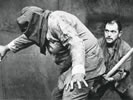Eye For Film >> Movies >> Goto, L'Île D'Amour (1968) Film Review
"Each side sees a different picture."
So says the schoolteacher (Fernand Bercher) in an early scene in Goto L'Île D'Amour, as he shows his young pupils the optical trickery that makes a portrait of their current leader, Goto III (Pierre Brasseur), also reveal the faces of his predecessors Goto I and Goto II, depending upon where one is seated in the classroom. The teacher's lesson about the history of Goto island and its eponymous 'kings' also serves, it will emerge, as a programmatic introduction to the illusory workings of Polish-born Walerian Borowczyk's first live-action feature itself.

Goto L'Île D'Amour, you see, is full of tricks and ambiguities that will trap any viewer confined to the single, narrow perspective that the film itself tries to impose. Here everything is filmed either head-on or in full profile, and there is a total avoidance of angled shots, or even of an exterior establishing shot to show the island fortress in which almost all the action takes place. This sense of tunnel vision is established right from the film's opening title sequence, where horses, running to and fro against a plain wooden wall, are framed in such a way by the unmoving camera that we can see neither floor, nor ceiling, nor even the animals' feet.
Within the film, the character with the broadest perspective is Grozo (Guy Saint-Jean). When we first meet him, he is on trial for the theft, significantly enough, of a pair of binoculars. More far-sighted than most, this cunning anti-hero will gradually scheme, manipulate and murder his way from the bottom to the very top of the island's pecking order, although he is driven by his desire not so much for power itself as for Goto's beautiful young wife Glossia (played by Borowczyk's own wife Ligia Branice).
Glossia, however, is already having an illicit affair with her riding instructor Gono (Jean-Pierre Andréani), and the two lovers are plotting to flee the island secretly by boat so that they can be together "for ever". Their dreams of escape are foiled by both chance and design – and not even Grozo, for all his forward thinking, can see the coming tragedy that will engulf him, too, in his hour of (apparent) triumph.
Shot in textured black-and-white (with occasional red-dominated colour inserts), Goto L'Île D'Amour is an atmospheric fable in which the director focuses as much on the objects and minutiae of daily life as on the human drama in the foreground. In a film where flies and fly traps play a significant rôle (Grozo is promoted to royal fly-catcher), Borowczyk documents the strange hierarchies and rituals of an island of the imagination, with the viewer cast as fly on the wall – and the result is a sort of absurdist anthropological allegory of blinkered outlooks, frustrated dreams and recurring tyrannies.
The island's clocks stopped, both literally and metaphorically, in 1887, when an apocalyptic earthquake struck, destroying most of the island's population. Since then the survivors have remained sequestered from the outside world and frozen in time – and if, bizarrely, every one of them has a name beginning with the letter G, then similarly every other aspect of their lives is minutely, and arbitrarily, controlled. Each lives in an assigned 'cell' in the island's prison-like fortress and performs an appointed task (from quarry working to dog keeping to music playing). Criminals have their fate (execution or royal pardon) decided in uneven duels on a public stage. The entombed dead are ceremonially slid down a ramp to the fortress' foundations.
Sexual activity, too, is closely regulated, apparently licit only when confined to the cells of the government-run bathhouse-cum-brothel – and so, while the title of Goto L'Île D'Amour might suggest the sort of arthouse sexploitation (Immoral Tales, La Bete, Behind Convent Walls) or softcore pornography (Emmanuelle 5) for which Borowczyk would later become known, here eroticism is as oblique, as sublimated, and as fetishised, as desire is repressed on Goto itself. True, there is occasional nudity, and even congress, to be glimpsed here, but far more overtly, irrepressibly sexual than these is the image of Grozo at work, lovingly polishing the boot of his mistress on an upturned shoehorn. Still, eros will ultimately prove no less effective than any earthquake in unsettling the established order of Goto.
Fascism can all too easily be 'romanticised' as a slick, if sadistic, engine of power, seductive in all its crisp orderliness – think the sleekly aestheticised cityscapes of Metropolis or the perfectly white stormtroopers of the Star Wars saga. Borowczyk, however, presents Goto's tinpot dictatorship as a vision of shabby backwardness, where all clothes are plain and look the worse for wear, all possessions are aging hand-me-downs, and all futures are doomed to repeat the past, only in a more degraded form. This is the totalitarianism of 1984 or Brazil, dusty, regressive and utterly deglamorised – and it is a tribute to Borowczyk's illusionist powers of showing a different picture to each side that his film was banned both in Poland under the Communists and Spain under Franco.
Crowning it all is the final, literally blink-and-you'll-miss-it image of the closed eye of a recently deceased character suddenly fluttering, which either 'rationalises' all the preceding surrealism as part of someone's REM-state dream (without making it clear exactly who that someone might be), or else suggests that not even death can provide an escape from the hermetic nightmare of the island. It is an aptly perplexing end to an unnerving cinematic experience.
Reviewed on: 04 Jun 2009


















